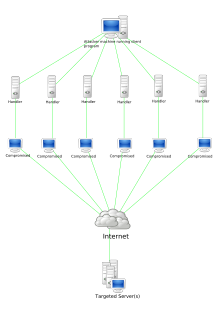
Back هجمات الحرمان من الخدمات Arabic Ataque de denegación de serviciu AST DoS-hücum Azerbaijani Attacke zua Deanstblockade BAR Атака за отказ на услуга Bulgarian ডিনাইয়াল অব সার্ভিস Bengali/Bangla Atac de denegació de servei Catalan ڕێگەگرتن لە خزمەتگوزاری CKB Denial of service Czech Denial of Service German
This article needs additional citations for verification. (February 2024) |

In computing, a denial-of-service attack (DoS attack) is a cyber-attack in which the perpetrator seeks to make a machine or network resource unavailable to its intended users by temporarily or indefinitely disrupting services of a host connected to a network. Denial of service is typically accomplished by flooding the targeted machine or resource with superfluous requests in an attempt to overload systems and prevent some or all legitimate requests from being fulfilled.[1] The range of attacks varies widely, spanning from inundating a server with millions of requests to slow its performance, overwhelming a server with a substantial amount of invalid data, to submitting requests with an illegitimate IP address.[2]
In a distributed denial-of-service attack (DDoS attack), the incoming traffic flooding the victim originates from many different sources. More sophisticated strategies are required to mitigate this type of attack; simply attempting to block a single source is insufficient as there are multiple sources.[3]
A DoS or DDoS attack is analogous to a group of people crowding the entry door of a shop, making it hard for legitimate customers to enter, thus disrupting trade and losing the business money.
Criminal perpetrators of DoS attacks often target sites or services hosted on high-profile web servers such as banks or credit card payment gateways. Revenge, blackmail[4][5][6] and hacktivism[7] can motivate these attacks.
- ^ "Understanding Denial-of-Service Attacks". US-CERT. 6 February 2013. Retrieved 26 May 2016.
- ^ Elleithy, Khaled; Blagovic, Drazen; Cheng, Wang; Sideleau, Paul (2005-01-01). "Denial of Service Attack Techniques: Analysis, Implementation and Comparison". School of Computer Science & Engineering Faculty Publications.
- ^ "What is a DDoS Attack? - DDoS Meaning". Kaspersky. 2021-01-13. Retrieved 2021-09-05.
- ^ Prince, Matthew (25 April 2016). "Empty DDoS Threats: Meet the Armada Collective". CloudFlare. Retrieved 18 May 2016.
- ^ "Brand.com President Mike Zammuto Reveals Blackmail Attempt". 5 March 2014. Archived from the original on 11 March 2014.
- ^ "Brand.com's Mike Zammuto Discusses Meetup.com Extortion". 5 March 2014. Archived from the original on 13 May 2014.
- ^ Halpin, Harry (2010-12-17). "The Philosophy of Anonymous". Radicalphilosophy.com. Retrieved 2013-09-10.
© MMXXIII Rich X Search. We shall prevail. All rights reserved. Rich X Search